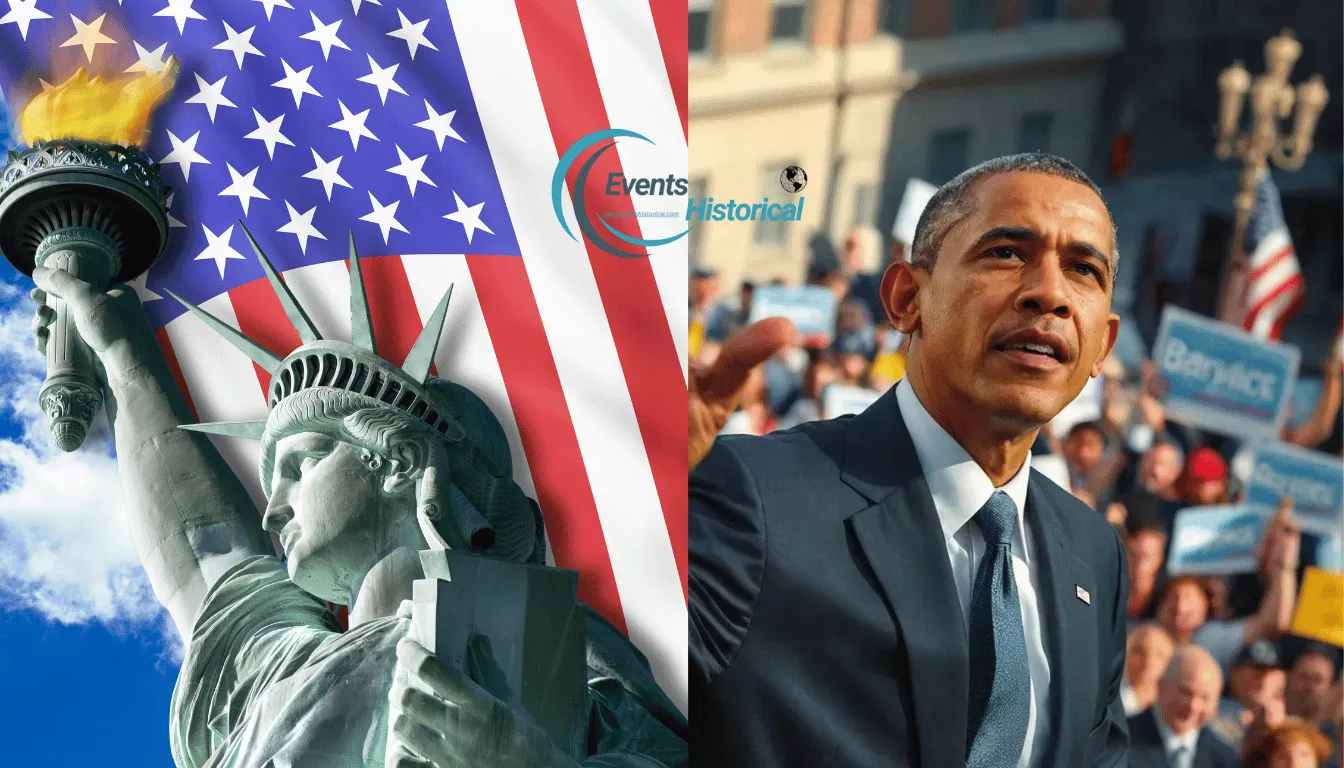Explore Barack Obama: The Historic 2008 Election of America’s First African American Pre. Discover the campaign, key moments, and impact of this groundbreaking presidency.
On November 4, 2008, Barack Obama provided a moment in the history of America when he was put into office as the first black president of the United States of America. As a successful democrat senator from Illinois, he trounced Republican senator John McCain from Arizona and this remains an important record in the map of American political evolution that demonstrate how change can enhance the democratic dispensation.
What made Barack Obama’s campaign so powerful? It deeply connected with the American people, leading him to this historic victory. As we explore this moment in U.S. political history, we’ll look at the key factors. We’ll also see how Obama’s presidency has had a lasting impact.
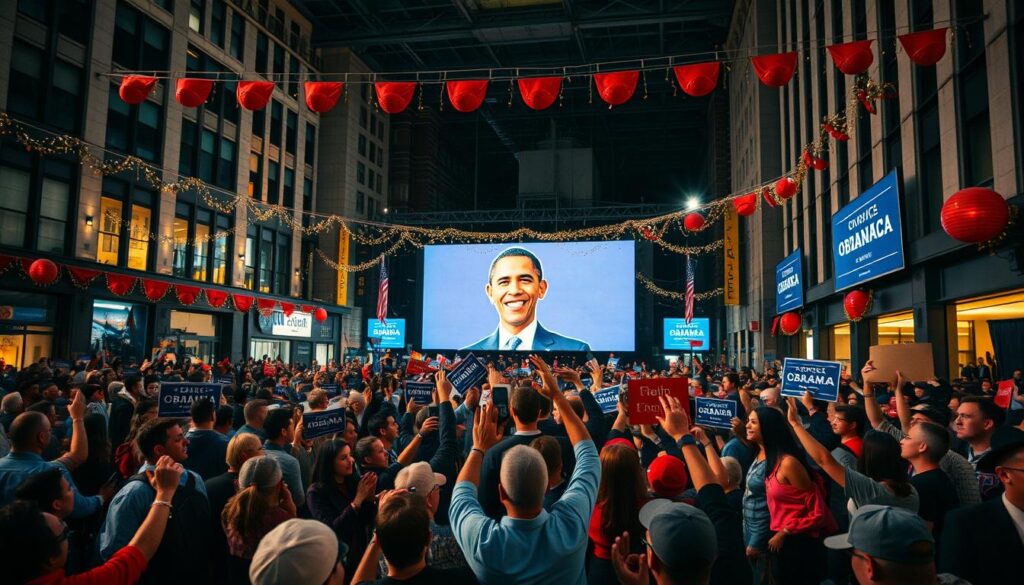
Key Takeaways
- Barack Obama became the first African American elected as U.S. President in 2008.
- Obama’s campaign message of “Hope and Change” resonated with millions of Americans.
- Obama’s victory marked a significant milestone in the nation’s racial and political history.
- Obama’s campaign fundraising and grassroots movement were unprecedented for a presidential candidate.
- Obama’s election victory reflected a shift in the political landscape, with the Democratic Party gaining ground in traditional Republican strongholds.
The Rise of Barack Obama
Early Life and Education
Barack Obama’s path to the White House started long before his 2008 win. He was born in Honolulu, Hawaii, to a Kenyan father and an American mother. His early years and education set the stage for his future in public service.
After finishing at Columbia University, Obama got his law degree from Harvard Law School. He was the first African American to lead the Harvard Law Review. His hard work and dedication to civil rights law opened doors in community organizing and politics.
In 1996, Obama was chosen for the Illinois State Senate. He served for three terms before moving to the U.S. Senate in 2004. His speech at the 2004 Democratic National Convention made him a national figure. This set him up for his presidential campaign just four years later.
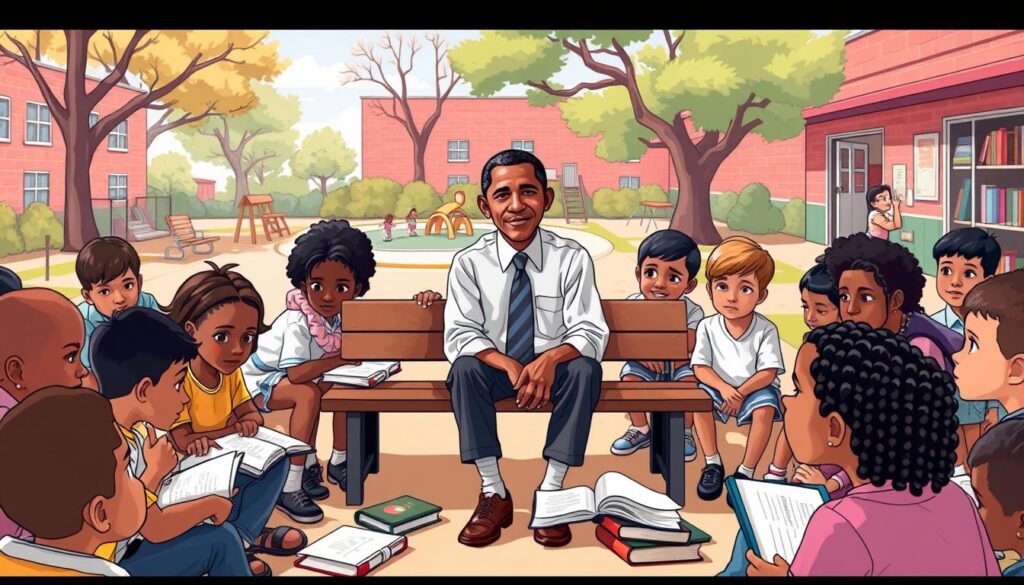
“The audacity of hope! In the end, that is God’s greatest gift to us, the bedrock of this nation; the belief in things not seen; the belief that there are better days ahead.”
Obama’s early years and education were marked by his academic success and passion for civil rights. These qualities helped him rise quickly to the presidency. His vision for a better America won over many voters, leading him to the top job.
Barack Obama: The Historic 2008 Election of America’s First African American President
On February 10, 2007, in Springfield, Illinois, Barack Obama announced his presidential run. He won the Iowa caucuses in January 2008. This victory made him a strong contender against Senator Hillary Clinton of New York. He outlasted Clinton in a tough primary campaign to win the Democratic nomination in early June 2008.
Obama’s team worked hard to build a grassroots following. They used his charisma, unique life story, and message of hope to attract big crowds. This helped him connect with people across the country.
Obama’s 2008 win as the first African American president was a historic moment. It went beyond party lines and captured the nation’s attention. His victory showed America’s progress in overcoming racial divides.
- Obama was born on August 4, 1961, in Honolulu, Hawaii, to parents Barack H. Obama, Sr., and Stanley Ann Dunham.
- He graduated from Punahou School in 1979 and earned a Bachelor of Arts degree in political science from Columbia University in 1983.
- Obama was elected as the junior Senator from Illinois in November 2004, before his presidential win in 2008.
“Change will not come if we wait for some other person or some other time. We are the ones we’ve been waiting for. We are the change that we seek.”
Obama’s 2008 win was a major milestone in American history. He became the first African American President. His message of hope and change won over voters nationwide, breaking down racial and partisan barriers.
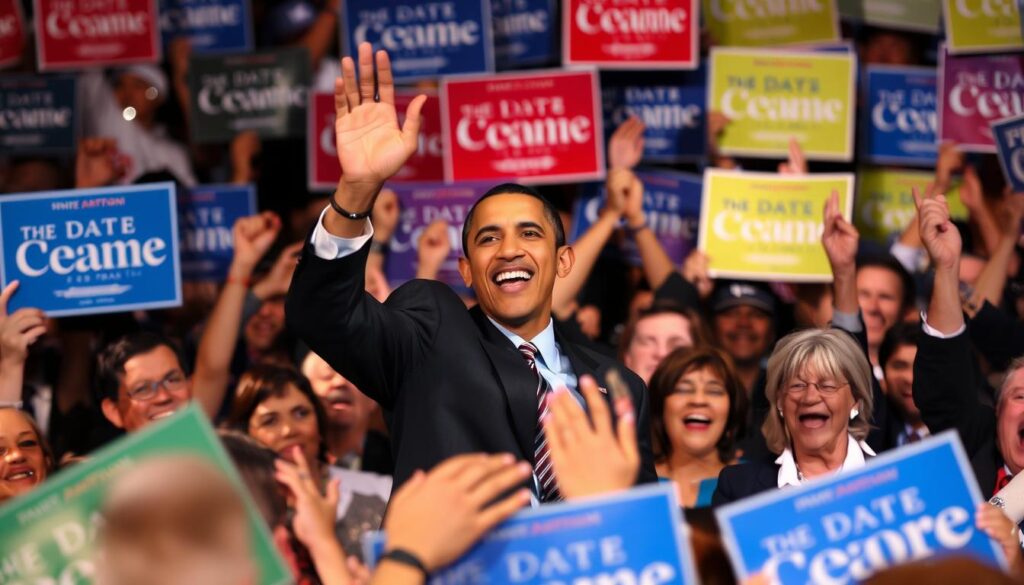
Overcoming Challenges on the Campaign Trail
Barack Obama’s 2008 campaign was a historic moment in American politics. He became the first African-American major party nominee. But, the path to the White House was filled with hurdles.
Obama faced tough issues like race and identity. He also had to tackle the nation’s big problems.
The Obama campaign was a game-changer with its use of the internet. The Washington Post reported that 3 million donors gave over $500 million online. Most of these donations were under $100.
This new approach helped Obama reach out to many voters. It built a grassroots movement like never before.
As the election neared, the focus shifted to the economy. A big financial crisis hit the country. Obama and his opponent, John McCain, had to show they could fix the economy.
Obama’s campaign also had to deal with race issues. There were incidents like comments by Senator Joseph Biden and Reverend Jeremiah Wright’s statements. The team had to handle these carefully, appealing to all voters.
Despite these hurdles, Obama’s campaign was adaptable and strong. His message of “hope and change” won over many. His use of technology and grassroots organizing led to a historic win in 2008.
The Power of Hope and Change
In 2008, Barack Obama’s campaign for the presidency was gaining speed. His message of “change and hope” deeply touched the American people. Obama’s power to draw big crowds, both in the U.S. and abroad, was key to his success.
His background in community organizing and his compelling speeches, like the 2004 Democratic National Convention keynote, boosted his grassroots movement.
Obama’s team worked hard to attract new voters, focusing on the young and African Americans. Their efforts paid off: Obama got over 69 million votes, 9 million more than John McCain. He won 365 Electoral College votes, more than needed to win, and took 28 states and the District of Columbia.
Obama’s Message and Grassroots Movement
The 2008 campaign saw high voter interest, the highest except for 2004. African American voter turnout hit a record 66.8%, with Blacks making up 13% of the electorate. Overall, 63% of eligible voters cast their ballots, the highest turnout in 48 years.
Obama’s message of change and hope inspired a diverse grassroots movement. His historic win as the first African American president was a major step towards civil rights and racial equality.
“Change will not come if we wait for some other person or some other time. We are the ones we’ve been waiting for. We are the change that we seek.”
– Barack Obama, 2008 Democratic National Convention Keynote Address
Election Night 2008: A Historic Moment
On November 4, 2008, Barack Obama made history. He became the first African-American President of the United States. Obama won 365 electoral votes, beating John McCain’s 173.
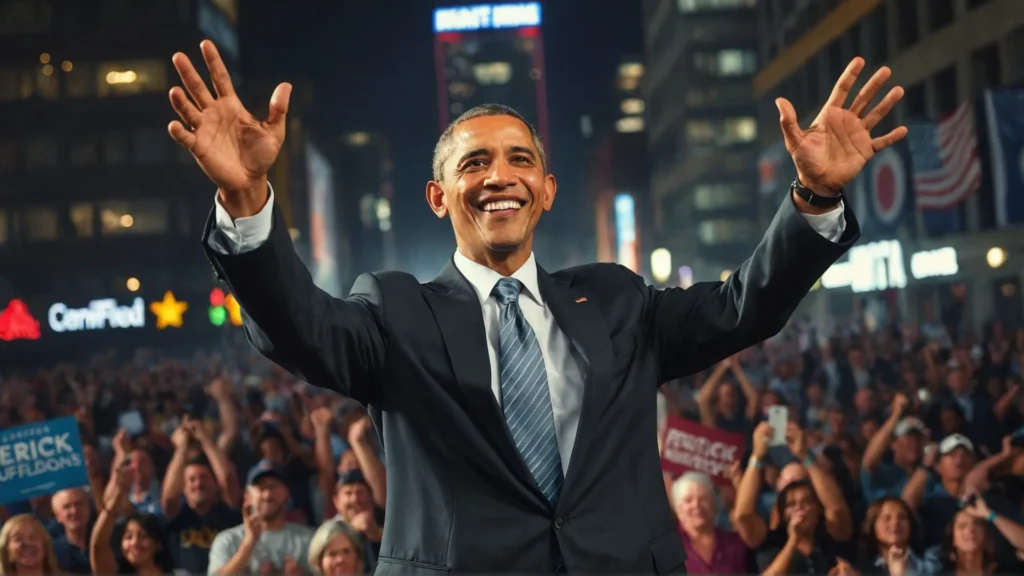
Over 69.4 million Americans voted for Obama. McCain got 59.9 million votes. This marked a big change in politics.
In Chicago’s Grant Park, over 200,000 people celebrated Obama’s win. They heard his victory speech. Obama said, “If there is anyone out there who doubts that America is a place where all things are possible, tonight is your answer.”
Obama won in places where Republicans usually do well. He took Virginia, Indiana, Florida, and Ohio. His message of “hope and change” drew people from all walks of life.
Barack Obama’s win was a big deal for the U.S. and the world. It showed progress in civil rights and the strength of democracy. As president-elect, Obama faced tough challenges. But his victory brought hope and showed that anything is possible in America.
Inauguration and First Term
Barack Obama’s historic presidency started with his inauguration on January 20, 2009. This event drew a record crowd in Washington, D.C. It was a moment of great celebration as the nation welcomed its first African American president. At 47, Obama was among the youngest to take office, bringing a new generation to politics.
During his first term, Obama made several key laws. In 2009, he passed the American Recovery and Reinvestment Act. This bill aimed to save and create jobs during tough economic times. He also signed the Lilly Ledbetter Fair Pay Act and an order to cap executive pay for companies getting federal bailout money.
In 2010, Obama passed the Patient Protection and Affordable Care Act, a major healthcare overhaul. He also signed the Dodd-Frank Wall Street Reform and Consumer Protection Act to regulate big banks. Plus, he introduced the post-9/11 GI Bill for veteran education and the 21st Century Communications and Video Accessibility Act for people with disabilities.
But, the 2010 midterm elections were tough for Obama. The Democratic Party lost control of the House, making it harder to pass new laws. Yet, in 2009, he won the Nobel Peace Prize. This honor was for his work in international diplomacy and cooperation.
| Policy Achievement | Year |
|---|---|
| American Recovery and Reinvestment Act | 2009 |
| Lilly Ledbetter Fair Pay Act | 2009 |
| Patient Protection and Affordable Care Act (Obamacare) | 2010 |
| Dodd-Frank Wall Street Reform and Consumer Protection Act | 2010 |
| Post-9/11 GI Bill | 2010 |
| 21st Century Communications and Video Accessibility Act | 2010 |
Barack Obama’s first term was filled with important policy wins. Despite the Democratic Party’s loss in the 2010 midterm elections, he made a big impact.
Re-election and Second Term
Barack Obama’s 2008 win was a big deal in American politics. He became the first African American president. But, his path to the White House was tough, and his second term had its own hurdles.
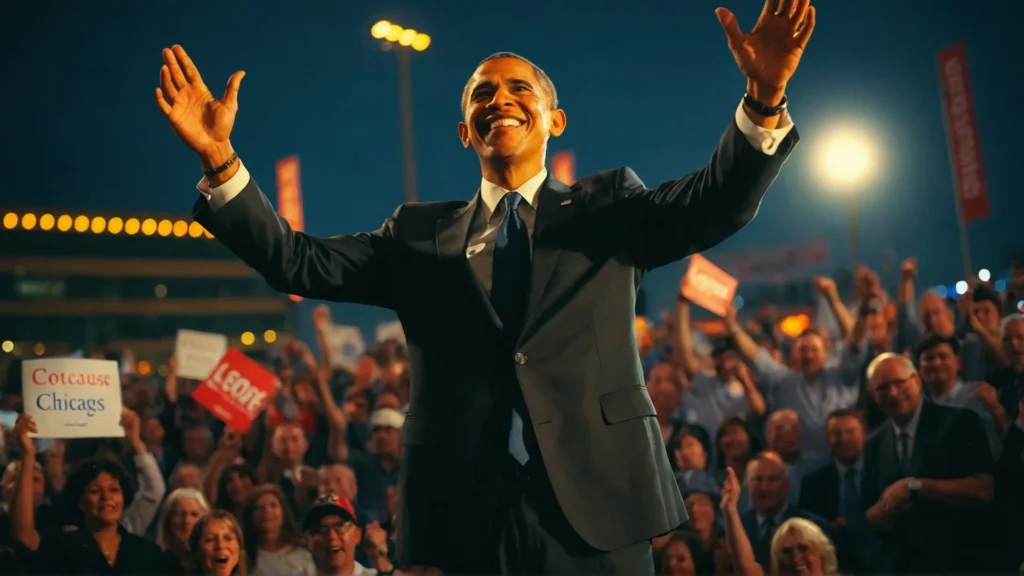
Foreign Policy Challenges
The Middle East was a big worry for Obama in his second term. The killing of Osama bin Laden was a success. But, a new threat, the Islamic State, started causing trouble.
Obama also had to deal with Iran. He worked on a treaty to stop Iran from getting nuclear weapons. These issues tested his diplomatic skills and needed careful planning.
“We don’t have a strategy yet” – Barack Obama, on the Islamic State threat in 2014
Despite tough challenges, Obama’s second term saw the U.S. economy get better. Unemployment fell from 10% to under 5%. The Dow Jones went up a lot, and Obamacare helped millions get health insurance.
But, Obama faced growing opposition and disapproval. This is a common problem in today’s politics. It shows how hard it is to lead in a divided country.
Obama’s Legacy and Impact
Barack Obama’s presidency was a historic moment for the U.S. as the first African American president. His leadership brought about significant political and social changes. His influence is seen in many areas of American life.
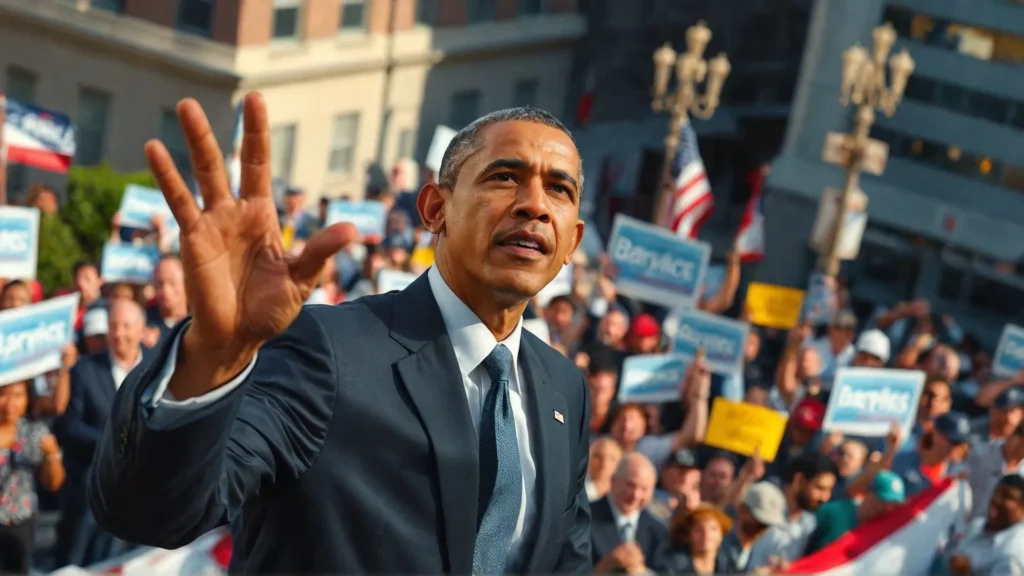
During his final year in office, Obama spoke at two key events. At the 50th anniversary of the civil rights march, he said, “Our union is not yet perfect, but we are getting closer.” At the National Museum of African American History and Culture, he noted, “We celebrate, mindful that our work is not yet done.”
Obama’s 2008 election was a major milestone. He became the first Black presidential nominee from a major party. He won nearly 53% of the popular vote and 365 electoral votes, winning states the Republicans had in the past.
His campaign drew a record number of donors, many of whom were young and from diverse backgrounds. His message of “hope and change” inspired many, leading to a high turnout among youth and minority voters.
| Metric | Value |
|---|---|
| Obama’s share of the popular vote in 2008 | 53% |
| Electoral votes won by Obama in 2008 | 365 |
| States won by Obama that had previously voted Republican | Colorado, Florida, Nevada, Ohio, Virginia |
| Percentage of Americans who believe race relations have worsened under Obama | 54% |
Obama’s presidency was a significant step forward, but it also faced challenges in race relations. A CNN/ORC survey found that 54% of Americans think race relations have gotten worse under Obama. This includes 57% of whites and 40% of blacks.
Looking back, Obama’s presidency has left a lasting impact on the U.S. His legacy will continue to influence American politics and society for many years.
– Barack Obama, 50th anniversary of the civil rights march from Selma to Montgomery
Reflections on a Groundbreaking Presidency
Personal Stories and Memories
Barack Obama’s election in 2008 was a historic moment in American politics. Over 71 million people watched the election on TV, the highest rating in nearly three decades. Nearly a quarter-million people gathered in Chicago’s Grant Park, showing the grassroots support for Obama.
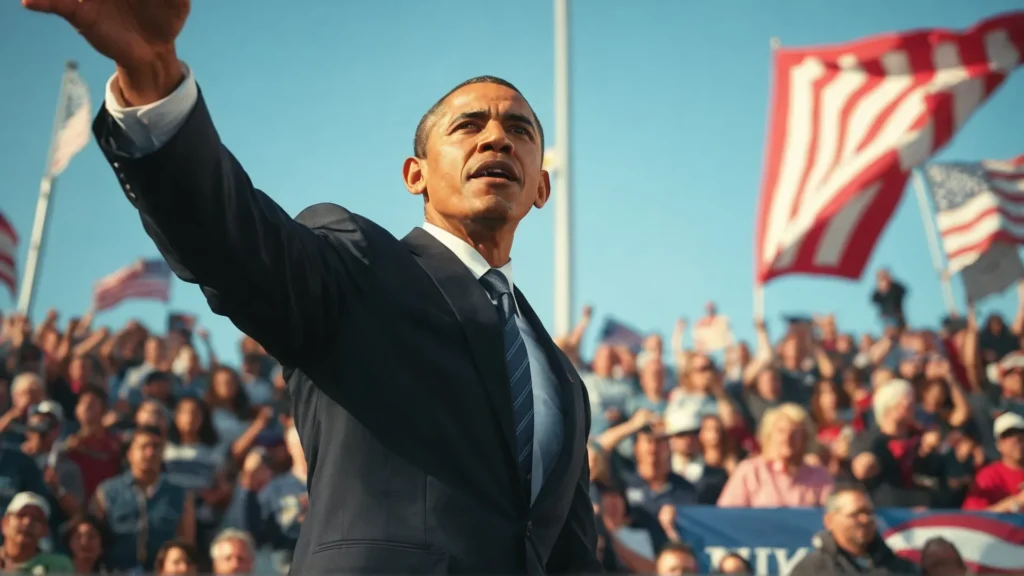
Obama’s victory was significant to many. Representative John Lewis of Georgia saw it as a step towards racial equality, connecting it to Martin Luther King Jr.’s legacy. Even outgoing President George Bush praised Obama’s historic win, seeing its impact on the nation.
The election of the first African American president was seen worldwide as a step towards inclusivity. Middle school students shared their stories, discussing how Obama’s presidency has inspired them. The “Obama and Kids” social media campaign showed how children connected with the President, highlighting the campaign’s grassroots nature.
“President Obama’s election had a profound impact on my life. It showed me that anything is possible, and that with hard work and determination, even the highest office in the land can be within reach.” – Middle School Student
The presence of a black family in the White House was seen as a shift in racial equality. Students wanted the next president to be relatable and open, like Obama. They shared their hopes and concerns for the future, seeing Obama’s presidency as a source of hope.
A 2015 study showed Obama’s presidency’s impact on African American high school males. The study found that 7 out of 8 participants felt positively impacted. The data highlighted how the presidency shapes aspirations and the importance of a relatable leader.
The Future of American Politics
Barack Obama’s election in 2008 was a big deal. He was the first African American president. This victory opened doors for more diversity in government.
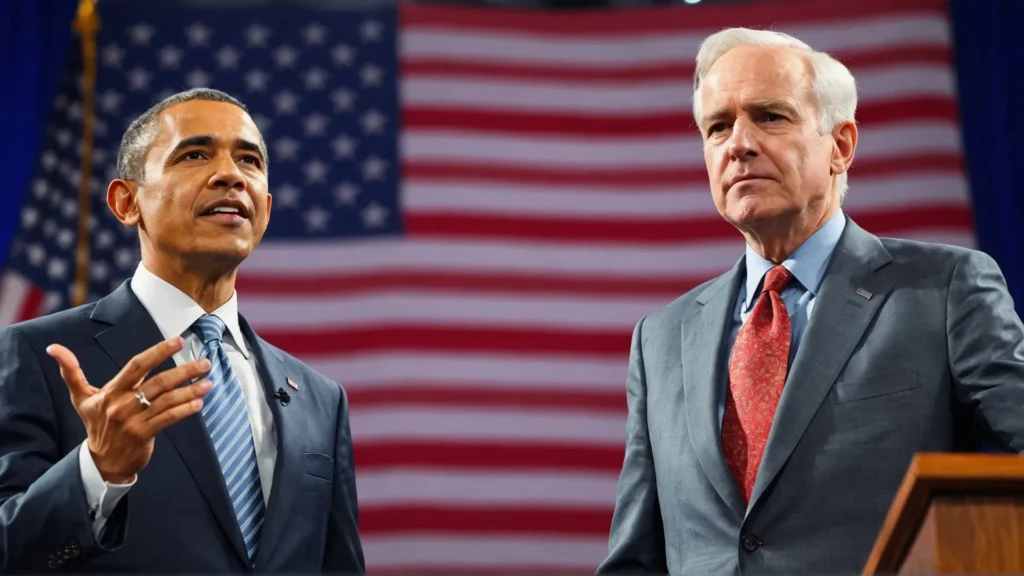
Now, people are talking a lot about what’s next in American politics. The Democratic Party’s future is key to understanding this. Obama’s win energized the party’s progressive side. But, the Republican Party’s comeback and the Tea Party’s rise made things tough for Obama’s plans.
The 2016 election of Donald Trump added more complexity. Trump used racial and anti-immigrant feelings to win. These issues are hard to overcome, with hate crimes and white nationalism being big worries.
The Democratic Party faces big challenges ahead. They need to win over young people and working-class voters. If they can, they might lead the country towards a more inclusive democracy.
The future of American politics is about more than just elections. It’s about the country’s democratic values and its people’s willingness to tackle tough issues. Whether Obama’s progress can last is uncertain. But the future of the country is at stake.
Conclusion
Barack Obama’s election in 2008 was a historic moment for the United States. It was the first time an African American became president. This event changed America’s politics, society, and culture in big ways.
Obama’s win showed that even with big challenges, an African American could lead the country. His campaign faced racism and bias, but he won by inspiring many. His victory changed American politics forever.
Obama’s win had a lasting effect. It made more African Americans vote and get involved in politics. This change has helped bring more diversity to government offices. It’s a step towards a more inclusive America.
FAQ
What was the significance of Barack Obama’s historic 2008 election as the first African American president?
Barack Obama’s 2008 win was a big deal in American politics. He was the first African American president. This victory opened doors for more diversity and representation in government.
How did Obama’s campaign strategies and grassroots movement contribute to his success?
Obama’s campaign was groundbreaking. It used the internet for organizing and fundraising. His inspiring speeches, like the 2004 Democratic National Convention keynote, helped build a strong grassroots movement.
What were some of the key policy achievements during Obama’s presidency?
Obama passed three major bills in his first term. These were for economic stimulus, healthcare reform, and financial reform. He also pushed for fair pay for women and new consumer protection. In his second term, he led the operation that killed Osama bin Laden, the Al-Qaeda leader.
How did Obama’s presidency influence the trajectory of American politics?
Obama’s presidency was a turning point in American politics. As the first African American president, he paved the way for change. His legacy continues to shape the country’s politics, pushing for a more inclusive democracy.
What personal stories and memories were shared about the impact of Obama’s election?
The article shares personal stories from Obama’s campaign and the 2008 election. These stories highlight the campaign’s grassroots efforts and the impact of witnessing history. They show the power of community engagement and the significance of Obama’s win.

